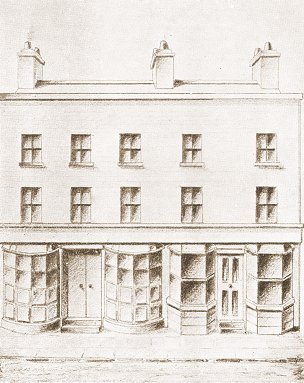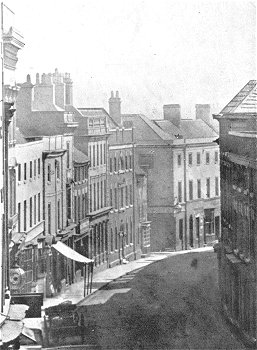| This article, from the June 1907 edition of the
Wolverhampton Journal was written by a man who for
many years ran the town's largest manufacturing
chemists, Reade Brothers. It is a history of an
earlier and equally important concern; Mander,
Weaver and Company, and also gives an insight into
the town's chamber of commerce and its members.
Bev Parker.
|
| An Old Wolverhampton
Business One of the oldest
businesses in the County of Stafford is that so long
carried on in Victoria Street, Wolverhampton by Messrs.
Mander, Weaver, and Company, manufacturing chemists, and
for many years since by my firm of Reade Brothers and
Company, Limited
This business was originally
founded in the year 1773, by Mr. John Mander, a great
uncle of the late Mr. C. B. Mander and Mr. S. S. Mander,
a gentleman of high reputation, who resided on the Penn
Road, in a square red brick house a little beyond
Merridale Street, which was long known familiarly as "Gallipot
Hall", an evident allusion to the trade carried on by
its worthy owner.
The grounds attached to this house
were at one time very extensive, and its owner's name
was given to the adjoining street known as Mander
Street. This house is now occupied by Dr. Brooks, and
was formerly by Mr. S. Ingram.
The business was at first carried
on in King Street, but was eventually removed to
Victoria Street, or Cock Street, as it was called till
the visit of Her Majesty Queen Victoria in 1866
suggested the propriety of discarding a name associated
with the barbarous pastime of cock fighting, and the
substitution of the present one. |
|

Mander, Weaver & Company's
premises. |
Here Mr. Mander secured extensive
premises with a large frontage to the present Victoria
Street and stretching back to John Street, where they
occupied about a third of one side of the street. He
found an immediate opening for a large business, both at
home and abroad, and commenced to manufacture choice
chemicals for the London and Foreign Markets. He was one
of the earliest manufacturers of calomel and other
mercurial preparations, which at that time found an
extensive demand as medicinal agents both in England and
other countries.
He devoted himself largely, also,
to the production of chemicals used in the arts and
manufactures of the world, and founded a trade with the
United States which is still continued by my present
firm, owing to the high reputation the goods acquired,
although as much as forty percent duty is imposed on the
goods on their entrance into the States. |
|
Mr. John Mander, though a
far-seeing and prosperous manufacturer and business man,
was not merely a business man, but deeply interested in
religious, educational, and philanthropic movements and
a generous supporter of them.
When the first Nonconformist Church
established in Wolverhampton, called the Old Meeting
House, in John Street, became for a time Unitarian in
doctrine, Mr. John Mander strongly opposed such teaching
there, contending that the Meeting House was built for
the preaching of Trinitarian doctrines, and could not
rightly be used for the promulgation of Unitarian
principles, while his brother Mr. Benjamin Mander, great
grandfather of the present Alderman Charles Mander, who
was a trustee of the said Meeting House, interfered to
prevent the removal of the then minister of the church
(who was opposed by the Unitarian adherents), and
commenced a long litigation to wrest the building from
the Unitarians who for many years had had possession.
After a lawsuit of 33 years,
continued by Mr. Charles Mander (grandfather of Alderman
C. T. Mander), the property had to be sold to defray
expenses.
We next find Mr. John Mander
engaged in purchasing a piece of land at the corner of
Queen Street and Market Street, for the erection thereon
of a Congregational Church, and Mr. Mander became a
prominent and munificent supporter of the church which
as soon after built on the site. On his death in 1827,
at the age of 73, a handsome tablet was erected in that
church to his memory by the church and congregation
assembling therein. The tablet reads as follows:
This Tablet,
In permanent remembrance of
JOHN MANDER, GENT.,
The unwearied and munificent
friend
of Religion and Education,
is inscribed
By a grateful and affectionate Church
and Congregation,
As a record of Piety, Virtue and Intelligence.
He died August XXII., MDCCCXXVII.
Aged LXXIII.
Mr. Mander was joined in his
business by Mr. Bacon, a gentleman of fine business
skill and of considerable wealth, and the firm traded
for some years as Mander and Bacon. Subsequently Mr.
John Weaver who, it is believed came from Shropshire,
joined the firm, which then traded as Mander, Bacon and
Weaver.
Mr. Weaver was a man of great
energy and application to business, and developed the
trade considerably, opening up connections in Lancashire
and Yorkshire, as well as throughout Staffordshire,
Shropshire, Derbyshire, Warwickshire and Worcestershire.
He was not a man who wasted much
sympathy. On one occasion it was reported to him that
one of his employees had fallen down a hoist on the
premises and been killed. He replied: "Ah! in the midst
of life we are in death; is the cart loaded for
Birmingham?" and proceeded with his business as usual.
Shortly after Mr. Weaver joined the
firm, Messrs. John Mander and Bacon retired, and Mr.
Benjamin Parton Mander became a partner in the firm,
which then traded as Mander, Weaver and Mander. The
last-named retired about the year 1833, and the business
was then carried on by Mr. John Weaver as Mander, Weaver
and Co.
He died in 1849, and his son, Mr.
Frederick Weaver, then continued the business under the
old style till the year 1873, when it was purchased by
my brother and myself and carried on in new premises in
Victoria Street, under the style of Reade Brothers, and
later also in the commodious buildings in Cleveland
Road, and in works at Cable Street and Dixon Street,
Monmore Green, under the style of Reade Brothers and
Company, Limited.
The old premises were acquired by
Messrs. Mander Brothers, of John Street, whose works
adjoined, and who found these additional premises most
useful in the development of their business.
Mr. Frederick Weaver was a man of
few words and of somewhat reserved and unsympathetic
manner, but the writer can testify to a considerateness
which perhaps would not have been expected by those who
knew less of him. He resided for many years at Beech
Croft, Tettenhall, and lived latterly a quiet and
retired life. His death took place in the year 1880.
It is interesting to note that in
the year 1819, a number of firms in Wolverhampton
decided to form themselves into a Chamber of Commerce,
and amongst others, Messrs. Mander, Weaver and Mander,
subscribed their names. Other firms were: Joseph
Tarratt, whose warehouse was well known in Townwell
Fold, and whose business was afterwards carried on by
the Messrs. Ford: Messrs. Ryton and Walton (father of
the late Mr. Fred Walton), of the Old Hall Japan Works. |
| Messrs. Shaw and Crane, the former a grandfather of
Mr. C. E. Shaw, M.P., and founder of John Shaw and Sons,
the latter the father of the late Mr. Charles Crane, of
the Crane Foundry; Messrs. J. and W. Walker, of the firm
now known as T. W. and J. Walker, merchants; Messrs.
Earp and Wynn, the former the father of the late Mr. H.
S. Earp, of Dunstall, the latter the father of the late
George Wynn. Mr. John Dixon, ironmaster and father of
the late Mr. Edwin Dixon, J.P.; William Sparrow and
Sons; Wm. Ward, father of the late Mr. Henry Ward; Mr.
T. B. Elwell, father of the late Charles and Paul
Elwell, and grandfather of Mr. Charles Elwell, of the
Economic Coal Company; Mr. Joseph Underhill, father of
the late Mr. Henry Underhill and Mr. James Underhill;
Messrs. Wm. Briscoe and Son, the grandfather and father
of Mr. R. H. Briscoe, of Chillington. |

Old Victoria Street. |
|
Messrs. Henry Rogers and Co.; and
Mr. Thos. Savage, merchant, of Church Lane, an uncle of
the late Mr. Benjamin Savage, and of Dr. Savage, of
Birmingham, who was killed in the recent earthquake in
Jamaica.
Many of these firms still flourish,
showing that the foundations of their businesses were
well laid, and that the building up has since progressed
wisely.
It may be said of the firm of
Mander, Weaver and Company that in many respects they
were distinctly ahead of their time, bringing scientific
methods to bear on their manufactures, and showing much
enterprise in the conduct of their business. They were,
for example, the first persons to manufacture gas in the
town, and, when my firm took over their business in
1873, the gasometer and other plant for gas making was
still in full operation on the premises.
The lesson to be derived from the
firm's history is that skill, scientific knowledge, and
energy are an absolute necessity for the maintenance and
development of such a business, and that in proportion
as these are contributed so will it flourish and extend,
and, with fair dealing and integrity added, will remain
unshaken and unmoved amidst the chances and changes of
the business world.
What a different Wolverhampton the
various members of the firm lived in from that which
meets our eyes today! When Mr. John Mander commenced
business in 1773 the population of the town was about
10,000. For 75 years after this date there was no
Corporation, and for a great many years no Gas Company,
no Water Works, no system of sewerage, no Borough
hospital, no Free Library, no Cemetery, no railways, no
Covered Market in the town. When the writer came to
Wolverhampton in 1865, the population of the town was
about 64,000; there were no tramways, no omnibuses, no
public parks. Now we have a population of over 100,000,
the electric light, a fine system of electric tramways,
two beautiful parks, a spacious Town Hall, ornate school
buildings, and immense improvements in all directions.
It is largely owing to the
enterprise, skill, and business ability of such firms as
have been here mentioned that these advances in the town
have been possible, and it is not unprofitable to look
back occasionally and reflect on the men and their
methods who helped in their day to make the business of
the town what it is, and prepared the way for the
eminent men who as merchants and manufacturers now lead
the commercial life of our town.
May a long succession of such firms
be vouchsafed to us, filled with intelligence to devise,
and energy to carry out, new schemes of commerce in our
midst, while by their knowledge, their probity, their
fairness, they uphold the reputation of the town and
contribute to its progress and permanent prosperity. |
 |
Return to
the
previous page |
|